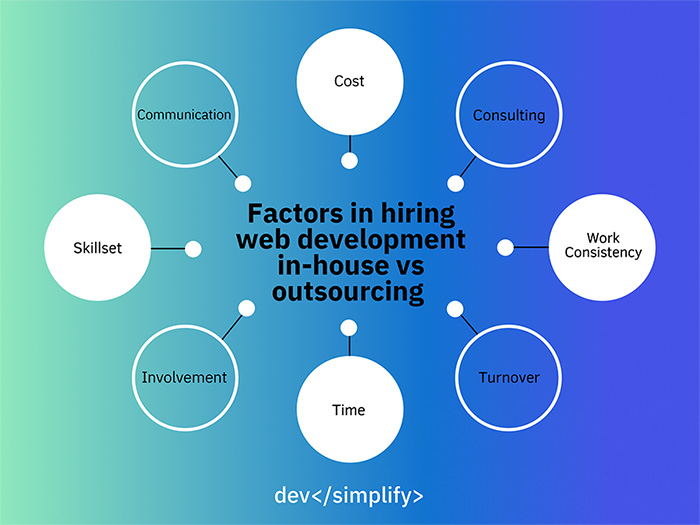
The debate on hiring in-house developers versus outsourcing web development to an external company is a long-standing one. Business owners have toiled over this question.
And while we can’t make the decision for you, we can give you the advantages and disadvantages to help you make the most informed decision for your business– read on to get the full breakdown.

What’s the Difference?
First, let’s define these terms.
An in-house web developer is someone that you hire full-time to work for your company only. In-house developers are therefore official employees for you.
On the other hand, outsourcing web development typically means delegating specific tasks or projects to an outside company–whether that be a full development company or an individual freelancer.
Factors to Consider
With this understanding, we can now consider each of the factors that will affect your decision. Keep in mind as we go that the decision to hire in-house vs to outsource is very individual, and there is no one-size-fits-all answer.
We’ll go over the biggest, most relevant factors, and then you can evaluate how they each play into your business, and what you personally care about most.
Cost
One of the main advantages of outsourcing web development that typically draws businesses is the cost.
Normally it is much cheaper to hire out your web development needs because you won’t have to pay extraneous costs such as health care or more office space. It is also common to outsource to other countries altogether, which can cut costs significantly.
If you choose to hire an in-house developer, while you’ll get much closer interaction with them, it comes at a higher price. And since they’d be your official employee, you have to factor in those other employee costs besides simply the development work.
Communication
The last point brings up a second major factor of accessibility and communication.
When you outsource, you’ll lose a bit of control and closeness to the people working on your web development. They won’t be physically present all the time for you to watch, interact with, gain your trust, and communicate as easily with. If this is crucial for you in collaboration, you may want to hire someone in-house to have more consistent and easy communication.
This is not to say that when you hire an outside company to do the development work that you can’t communicate with them, just know that you will relinquish some control and ease.
Involvement
Along the same lines as communication, you need to evaluate how involved you want to be with the web development process. You may want to be heavily involved in designing and decision-making. Or, you may prefer to not have to worry so much about the little details.
Outsourcing web development may limit your worries if you can step back and let them worry about it for you, but as a business owner it may stress you out even more to not know what’s going on along the way.

This factor is very personal and depends on how you work best.
Another aspect of this factor is understanding how much you know on the subject–how involved is it possible for you to be?
If you’re not a CTO or have a technology background, it may be difficult to manage your own in-house hire since their job can be so technical.
Don’t take this the wrong way, because you’re probably successful and great at what you do– but if you don’t know how to manage their job or have someone else in your company that can, this can be a major roadblock. Or it could become significantly more costly if you have to hire a technical manager.
One option to get around this issue is to hire a consultant to aid you in the process of finding a great developer.
You can usually hire out consulting work for a temporary, specific project, and they will help find, hire, and onboard your in-house hire. This can help you tremendously since they have the knowledge to ask the right questions and be involved where necessary while helping transition you into that role.
Skillset
You clearly want your web development done well. Especially because this is a technical field, where a lot could (and does) go wrong. You want someone who knows how to put out fires that come up consistently in development–so this is an important place to evaluate.
Can you get the same level of skill from going in-house and from outsourcing?
The unfortunate answer is that it depends.
An established web development company usually has the advantage of having a whole team of developers with a variety and depth of experience to get unique jobs done. In hiring someone yourself, you’ll probably have to build that diverse team over time.
In order to have a quality site, it takes many different skills– front and back end development, web design, content creation, systems integration, digital product design, the list goes on. And again, while it’s always possible that there is someone who can do all of these things well, it is rare.
This is important to keep in mind in your search to hire someone.
Consider how unique and robust the development you’re looking for is. Is it fairly standard stuff, or is it more specialized?
If you’re looking for help doing something that requires an advanced skill set, it may save you a headache to hire a company that you know can handle it.
But as in any business, there is always a risk that the company you outsource to doesn’t do what they say they can, and it’s always possible that an individual freelancer or in-house hire could blow you away with the skills they have. This is where that unfortunate ‘it depends’ comes in again.
In any decision like this, we suggest interviewing anyone you’re looking to hire–in-house or not.
Read up on what information you can so that you can ask informed questions and gauge if who you’re talking to can get the job done. It doesn’t matter if they’re a company of 1,000, 100, or 1, do your homework to give yourself the best chance.
Time
It takes time to research and find the web development team you want to hire. And it also takes time to find, hire, and train an in-house developer. This factor is important, but it’s a factor that exists across the board.
In another sense, consider the length and breadth of your project. How long will it take? Is it ongoing, or is it something short-term? Can it fill a developer’s schedule full-time if you hire in-house? These are all important questions to ask.
If you want to have someone available full-time for the foreseeable future, you might want to hire in-house. If you have a one-time project or more sporadic work, outsourcing your web development may be the way to go. Just don’t forget that websites still take consistent upkeep too!
Turnover
Ah, dreaded turnover. No one’s favorite word.
But it’s yet another factor in the puzzle!
It is obviously much more likely to deal with turnover when hiring in-house. If you outsource to an outside company, you will rarely have to think about this. And since they rely on your good word as their client to stay in business, they will almost never jump ship on you in the middle of a project.
Final Thoughts
It’s not always an easy choice to decide who to hire for your web development needs. If only we could give you a one-answer-fits-all!
But since there are so many factors to consider, we’ll leave it up to you. Let us just leave you with 2 things we believe are most important to end on:
1) great web development can be a massive asset to the growth of your business. And it is a very technical skill. So investing in someone who will do a great job is worth it.
2) as we stated earlier, it is your job to be as informed as possible. What works for your business may be completely different than someone else, and that’s great! Just look into the factors for your unique situation. Draft a personal pros and cons list. Take your time, be informed, and you’ll make a great choice for your business needs!




